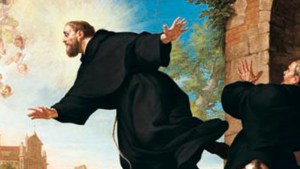Autism spectrum disorder (ASD) affects millions of individuals around the world, and more and more children and adults are being diagnosed each year. It is a condition characterized by “difficulties in social interaction, verbal and nonverbal communication and repetitive behaviors.”
In the past individuals who possessed these traits were highly misunderstood and often badly treated. They were viewed as different, “quirky,” or in severe cases locked in mental institutions.
However, with all the struggles of being on the autism spectrum, there is hope that this apparent defect can be united to the cross of Christ and lifted up to become a great benefit to others. There have been many saints over the centuries who struggled greatly with their behavioral difficulties, but who persevered and followed God’s will in the midst of it all.
Having such little information about the life of a saint makes it difficult to make a certain diagnosis of autism (indeed, the spectrum is broad enough that diagnosis is complex under the best of circumstances), but there are a few individuals where a positive diagnosis may have been likely. For the purposes of this article here are three saints who, if they lived in the 21st century, may have been labeled as “on the spectrum.”
Servant of God Brother Juniper
One of St. Francis of Assisi’s original followers, Brother Juniper was well loved by Francis for his devotion and profound humility. However, according to the Little Flower of St. Francis, Juniper did not always understand the accepted standards of social interaction.
Once while visiting a sick friar, Juniper asked him if he could be of any service. The friar asked for pig’s feet to eat, as it would give him great consolation. Brother Juniper, feeling compelled to help the sick friar, took a knife from the kitchen, went into the forest and found a group of pigs feeding. Juniper caught one of the pigs, swiftly cut a leg off, and ran back to the kitchen to prepare it (leaving the rest of the pig in the forest). Unknown to Juniper, the man in charge of the pigs was standing there watching it all happen and quickly informed his master of the situation.
When St. Francis confronted Brother Juniper, he was entirely confused why the master of the pigs would be upset at what he did. In Juniper’s mind, he was doing a charitable deed and there was nothing wrong with cutting off a pig’s foot to help someone else out. Brother Juniper was eventually able to win over the angry master with his humility and simplicity.
There are many other similar stories regarding Brother Juniper’s inability to recognize social cues that make it possible he was “on the spectrum.” In the end, despite his apparent defects, Saint Francis was famous for saying, “Would to God, my brothers, I had a whole forest of such Junipers.”
Servant of God Léonie Martin
Born the middle child, Léonie was difficult, unattractive and sickly. Her mother, St. Zelie Martin, wrote in a letter to her sister-in-law, “The poor child worries me; she has a very undisciplined nature, and mentally she is underdeveloped.”
Léonie was expelled from school on multiple occasions for being unruly and disruptive. It took Zelie’s sister (who was a Visitation sister) great effort to discover how to teach the young child.
Even after trying different approaches to understanding, Zelie remained challenged by her daughter. She wrote in a letter,”I am fairly pleased with Léonie; if we could only subdue her obstinacy and soften her character, she would be a good girl — faithful and unafraid of the suffering she must endure. She has a will of iron; when she wants something, she will fight her way past any obstacle to reach her goal.”
Léonie’s struggles continued throughout her childhood and into her adulthood. However, she was able to persevere and, encouraged by her sister Thérèse, she learned the “little way” of sanctity. On account of her many struggles and mental challenges, the Leonie League for the Advancement of Autistic Persons has taken her as their patron.
Read more: Leonie Martin: St. Therese’s “difficult sister” continues on the road to canonization
St. Joseph of Cupertino
Throughout his life, Joseph was highly misunderstood and ridiculed by everyone. His frequent visions and sudden outbursts of anger made him an object of mockery. Additionally, Joseph was very absent-minded, awkward and extremely sensitive to his surroundings. When the school bell rang, Joseph would jump and drop his books on the ground.
In school, Joseph earned the nickname “open-mouthed” because his mouth was always open. He could barely read or keep focus and often would forget to eat his meals. However, even though he barely progressed in education Joseph didn’t seem to mind or notice and sought to gain entrance into a monastery despite this deficiency. Joseph figured that at least he could beg for bread as a Franciscan.
This also did not go well for Joseph. The community did not understand him and his inability to complete simple tasks without breaking something, and the experiment proved too difficult to handle. He was expelled from the monastery, but with nowhere to turn, Joseph came back and begged the community to at least hire him as a servant. The Franciscans consented, enrolled him in the Third Order and assigned him the task of taking care of the monastery mule.
Joseph’s joyful demeanor was infectious and over time they gave him a second chance and allowed him into the community. Joseph was eventually ordained a priest and is most famous for his ability to levitate while saying Mass (they tied a rope around his leg so that he wouldn’t fly into the ceiling). Despite his lack of education, awkwardness in social situations and inability to complete basic tasks, Joseph was widely known for his extreme piety, simplicity and humility.


